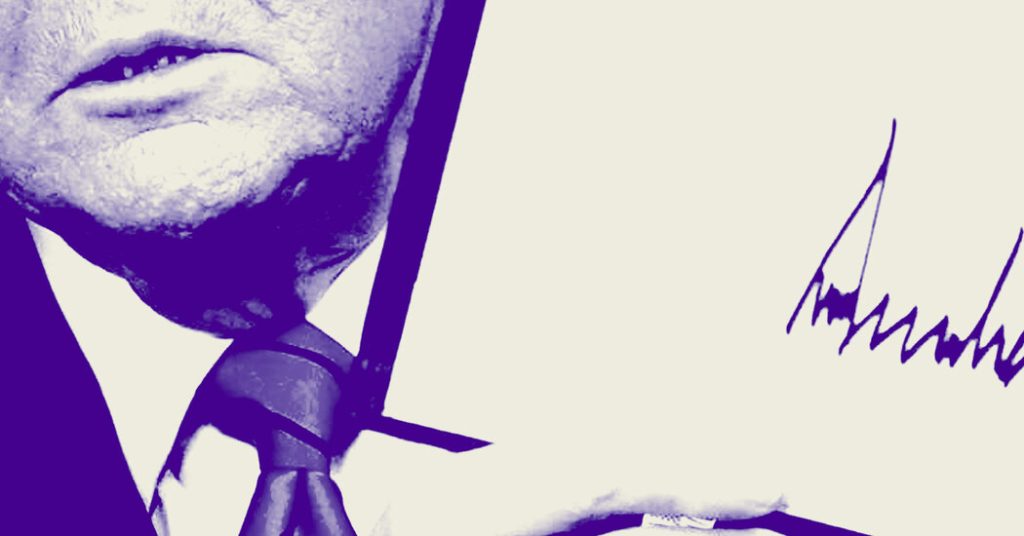The New York Times Opinion writer Binyamin Appelbaum has been writing and thinking about President Trump’s economic policy since his first term in office. In this episode of “The Opinions,” he joins the deputy Opinion editor Patrick Healy to talk tariffs, economic expansion and Trump’s recklessness.
Below is a transcript of an episode of “The Opinions.” We recommend listening to it in its original form for the full effect. You can do so using the player above or on the NYT Audio app, Apple, Spotify, Amazon Music, YouTube, iHeartRadio or wherever you get your podcasts.
Patrick Healy: I’m Patrick Healy, deputy editor of New York Times Opinion, and this is The First 100 Days, a weekly series examining President Trump’s use of power and his drive to change America.
This week we’re going to talk about Trump’s favorite way to bully allies and competitors alike, and that’s tariffs.
Audio clip of news: President Trump reached a deal with the leaders of Canada and Mexico to delay a 25 percent tariff on nearly all goods from their countries for one month in exchange for increased border security.
Clip of news: The U.S. went ahead with its promise of 10 percent tariffs on all Chinese goods headed to the U.S. China quickly responded.
Healy: I’m joined by my colleague Binyamin Appelbaum, who writes about economics, business and public policy for Times Opinion. He first wrote about Trump’s love of tariffs all the way back in 2016.
Binya, we’re back on Trump time. I woke up at 6 a.m. to a phone call and I thought: Who is he threatening now? Who is he bullying now? What is this like for you? Is it déjà vu to 2017?
Binyamin Appelbaum: It is déjà vu in the sense that things are just happening all the time, like fireworks going off at unpredictable moments, and then scrambling to try and figure out exactly what happened and exactly what it means.
The world in which the government announces its intentions in advance and tries to explain as fully as possible what’s going to happen — that’s not the world we’re living in right now. We’re back in this world where a tweet or an offhand remark at a news conference, or someone noticing that all of a sudden there’s a new group of people in a federal agency doing things, is how we find out about changes in our government. It’s disconcerting, alarming and hard to keep track of.
Healy: We both have a lot of experience covering Trump over the years. The last few weeks, does it feel like you’ve got surprises coming at you, or does it feel on some level predictable?
Appelbaum: To me, it has really felt a little bit surprising. Many of the projects that he’s embarked on at the beginning of his second term were things that were pretty well flagged during his campaign in terms of the direction of travel, but the way that he has proceeded has been, I think, quite different than in his first term.
It has been much more aggressive, much more comprehensive. And that really does make a difference. Frankly, the difference is that it’s not really him who’s the acting party in many of these cases. He has empowered a group of people, Elon Musk most prominently, who are acting on his behalf with a lot more force than he mustered during his first term.
Healy: Binya, the goal of this series is to talk about how Trump uses power, and we’re going to get to how you see that in relation to tariffs. But first, I’m curious about your thoughts on the 10 percent tariff that Trump has levied on all goods from China. Explain what’s the goal here and how it’s playing out so far and what you expect for U.S. consumers.
Appelbaum: Tariffs are a tax, and taxes increase prices. I think the basic expectation is that companies that are importing goods from China and paying these tariffs are going to seek to raise the prices that they charge either to retailers or directly to consumers, and that the cost of these tariffs will be substantially passed on to American consumers.
One important thing to note about that is it’s not just the price of the stuff from China that goes up. The whole point of a tariff is to create room for other retailers to also raise their prices so that goods made in America can compete or goods that come from other countries can compete. And so you’ll see broad-based increases in prices to adjust to the cost of the tariffs.
Healy: What do you think Trump is up to? Is it a classic trade war? Is it an opening bid to President Xi as part of a broader competition for dominance? Is Trump really serious about remaking the U.S. Treasury and American wealth through his external revenue service scheme with big tariffs?
Appelbaum: I think the part of this that is clearest — and it is one of Trump’s most enduring and consistently expressed beliefs — is that he genuinely does regard trade with China as bad for the United States. I think that is actually an ideological commitment to which he holds very strongly. And so on a very basic level, one can read these tariffs as an expression of that view.
He thinks trade with China is bad and he is trying to discourage it. That said, I think everything Trump does is transactional. He views the world as a constant negotiation and he is always open to using his tools as leverage to secure other things that he wants. During his first term, he was quite explicit in presenting his tariffs as a tool to bring the Chinese to the negotiating table.
I don’t think that is as top of mind this time around. I think there’s a recognition that the Chinese aren’t particularly interested in playing that game. But I don’t doubt that Trump would be willing to negotiate if he saw an advantage in it. That’s always part of his mind-set.
Healy: Binya, I’m so interested in what you said about the notion that Trump sees trade with China as bad. What are the potential knock-on consequences of that? Have we even begun to see how far this could escalate? Or do the laws of political and economic gravity curtail a trade war from not getting too out of hand?
Appelbaum: The first time I ever interviewed Donald Trump was for the first big piece that I wrote about his views on trade. This is back in 2016. And the point I made in that piece was that he really is reincarnating a perspective on the world known as mercantilism, which was the view that nations are losers when they spend money to import goods. And the measure of a nation’s wealth and well-being economically is to be a net exporter of goods.
This is a view of the world that was prevalent in a much earlier period, really before modern capitalism took hold. It basically is a worldview in which nations are competing with each other, and the international economy is a zero-sum game, so if China is winning then the United States is losing, and vice versa.
And this is really how Trump sees the world on a very fundamental level. The transformation of international dynamics is potentially enormous, and the cost to the welfare of societies that have been built up around these exchanges is potentially enormous as well.
Healy: So we’ve got one clear economic tool Trump’s using against China. Let’s talk about Mexico and Canada, because that seems different. Trump threatened 25 percent tariffs on goods from Mexico and Canada. And then lo and behold, we heard that Mexico and then Canada had reached these deals with Trump and the tariffs would be delayed for 30 days.
And who knows what will actually happen here? He got these promises of increased border security from both countries and his supporters and his base are treating this as a win and as a sign of Trump’s negotiating genius. But I think here we’re also looking at a reprise of Trump’s whole approach to the world as just a deal. You’re always trying to get the better of friend and adversary alike, but why start off by putting the squeeze on our friendly neighbors?
Appelbaum: I think Trump is a bully. I think he recognized weakness. I think he recognized that Mexico and Canada are singularly intertwined with the American economy, singularly dependent on their ability to import into the United States and export from the United States, and therefore they were vulnerable and could be pushed. Any reasonable assessment of America’s foreign policy problems does not begin with Canada as our major problem, but for Trump, what Canada does have that no other nation has is vulnerability. They’re weak.
And in his language and method of doing business, that makes them priority No. 1. Canada and Mexico were the nations from which he could most easily obtain concessions and demonstrate his strength. Those are things that are very important to him.
Healy: I want to ask you kind of a devil’s advocate question: If you’re president of the United States and you think you can get better deals with any country in the world, ally or adversary, why not do that on behalf of the American people? If your mind-set is there’s security to get, there’s money to get, there’s some kind of arrangement that I can get on behalf of our voters, our citizens, I’m going to do it. Why not do that?
Appelbaum: There’s a very famous test in psychology called the marshmallow test. Basically, you put a kid in a room, you put one marshmallow in front of them, and you tell them that you’re going to come back in several minutes and if they have not eaten the marshmallow, you will give them a second marshmallow and they can eat both of them.
Much of Donald Trump’s approach to life is to systematically fail the marshmallow test at every opportunity. He always eats the first marshmallow as soon as it’s on the plate in front of him.
Healy: He can’t resist.
Appelbaum: He can’t, and doesn’t think he should. That’s what’s going on here. The easy thing to do is to eat the marshmallow of compelling Mexico and Canada to concede to us on whatever set of issues he regards as important.
The reason that you should wait for the second marshmallow is that the long-term interest of the United States is best served by having close partnerships with these nations. In the first place, we share long borders with them. Our peaceful relationship with them has been a huge advantage to the United States over the centuries; being able to manufacture goods across North America rather than just in the United States is a force multiplier in our competition with China.
One thing to focus on here is if you believe that China is, big picture, the greatest threat to the United States, what you want to be doing is assembling an alliance in opposition to China. You want to be bringing your friends closer and make common cause with them in this effort to protect democracy and our system of government and our way of life, instead of taking advantage of those countries and squeezing them and bullying them and making them resent you.
It is not a good formula in the long term for pursuing the national interest of the United States. It’s just eating the first marshmallow.
Healy: You’ve captured so well that impulsive thinking, but at the same time, Trump sees his own genius as not doing the expected thing. He’s someone who kind of abhors tinkering around the edges.
It doesn’t surprise me that Trump was going to act like a god, but what did surprise me is that so many other people would treat him as if he was a God. Not just his own party, but Democrats in some way. They have so much experience dealing with Trump and yet, at least in these first few weeks, it doesn’t feel as if they’ve really figured out on a strategic level or political level or messaging level how to cope or contain or fight back against him.
Binya, you’re based in D.C. I’m really curious what the mood is just like there in week three of Trump as he upends things, not just with other countries but also with federal workers and agencies, which he seems to be at war against.
Appelbaum: Shock and disbelief. People are experiencing something that they don’t have a context to process. They don’t know what to do. They don’t know how to push back.
I’ve watched with sort of bleak fascination this basic faith many Democrats seem to have that if the right lawsuit is filed, this will all stop. There’s just this real conviction in the Democratic Party that the necessary response here is to go to court and to find a judge who will tell Trump to stop doing these things.
And I don’t mean to entirely minimize the importance of that. I think that the courts will have a role to play in adjudicating these disputes between Trump and American democracy.
But I do think that it’s a grossly inadequate response. We’re seeing that in real time. On the most basic level, just because the courts move more slowly than the Trump administration, and once things are broken they’re hard to put back together. But also because the courts and the Democrats are trying to talk to Trump in a language that he doesn’t really acknowledge.
He doesn’t accept the idea that there are rules that are binding, irrespective of whether you have the power to break them. In his view, the power to break a rule is justification for doing it. And Democrats are learning that lesson repeatedly. Or perhaps I should say they’re not learning that lesson repeatedly, because at least thus far, it really is striking how little effort we’ve seen to push back and to articulate a coherent opposition to try to stand up to this guy.
That’s something that really has not coalesced yet. I think it’s in part because he’s playing a different game than they are and they haven’t figured out the rules yet.
Healy: I have to say the people around Trump who I talk to, they are loving this. They see the Democratic Party as the party of lawyers, and they see the Republican Party as the party of leaders, and they feel like the majority of voters believe that, too.
And that if the Democrats just tie themselves up in process or weak tea news conferences, they’re going to get stampeded. I mean, that’s the Republican view.
I realize this is week three, but I find myself thinking about Trump’s form of bullying with putting Jordan and Egypt on the defensive over this scheme to turn Gaza into a real estate development project and the jawboning with Denmark over Greenland and Panama over the canal and just wondering if his strategy is grind them down, and in time he’ll create a new acceptability among countries and among American voters about what is possible.
I mean, this is a guy who wants to be remembered by history as an utterly transformative president — who added territory, added wealth and redefined America. And I just find myself thinking, whether it’s the Democrats or the Republican Party or other countries, is anyone going to stand up to him?
Is anyone going to call the bluff or punch the bully back in the face? Or is it just going to be a lot of people eating Trump’s dust?
Appelbaum: My own guess is that the answer is inevitably yes. There will be people who emerge to stand up to him just because there is another side to this debate and it’s going to find its leaders. There’s not anything like a broad consensus in American society in favor of these changes.
Trump supporters are fervently mobilized in favor of his project. But it was a very close election, and a lot of people in this country are equally bitterly opposed to much of what he’s doing. The question in my mind is whether the people who are currently installed in the role of leaders on the other side of the political spectrum are the ones who are going to be able to do that.
All of their instincts seem to be misplaced. All of their efforts feel weak or late or irrelevant. On a very fundamental level, a lot of the Democratic reaction to Trump for eight years now has been to repeat, “It’s complicated. It’s complicated. It’s complicated.”
I’m hardly alone in saying this, but they have needed an affirmative message for eight years now to juxtapose with Trump’s affirmative project of, Here’s what we’re going to do. And I think that until Democrats do that, they’re going to find it very hard to effectively oppose Trump.
There will be holding actions and places where he’s blocked and things it turns out he can’t do, but he will remain on the offensive and Democrats will remain on the defensive until they can articulate a coherent alternative to Trump’s vision for America.
Healy: I think that’s really true. Binya, stay away from the first marshmallow. Enjoy the two marshmallows. Thanks for talking to me.
Appelbaum: Thank you.
Thoughts? Email us at theopinions@nytimes.com.
This episode of “The Opinions” was produced by Vishakha Darbha. It was edited by Alison Bruzek and Kaari Pitkin. Mixing by Sonia Herrero. Original music by Aman Sahota, Carole Sabouraud and Isaac Jones. Fact-checking by Kate Sinclair. Audience strategy by Shannon Busta and Kristina Samulewski. Our executive producer is Annie-Rose Strasser.
The Times is committed to publishing a diversity of letters to the editor. We’d like to hear what you think about this or any of our articles. Here are some tips. And here’s our email: letters@nytimes.com.
Follow the New York Times Opinion section on Facebook, Instagram, TikTok, WhatsApp, X and Threads.








